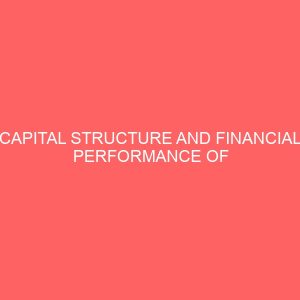Description
THIS RESEARCH IS ON EFFECT OF CORPORATE GOVERNANCE MECHANISMS ON TAX AVOIDANCE IN DEPOSIT MONEY BANKS IN NIGERIA.
ABSTRACT
The issue of corporate tax avoidance has received vast empirical examination in Western academe. This vast examination has however not been echoed in respect of research interest on tax avoidance in corporate entities in Nigeria. This study therefore sought to provide empirical evidence on whether internal corporate governance mechanisms such as board size, board independence, board ownership, high ownership concentration as well as interactions between high ownership concentration with board size and independence are significantly associated with corporate tax avoidance in deposit money banks (DMBs) in Nigeria. A sample of fourteen out of the fifteen listed DMBs on the Nigeria stock exchange (NSE) as at December 2014 were examined. Data for the study were sourced solely from secondary sources in the form of annual financial statements of the studied DMBs for the period 2006 to 2014. In order to tackle the issue of endogeneity, arising from simultaneity in studies related to corporate governance outcomes, the Arellano-Bond Generalized Method of Moments (GMM) estimation technique was used. The study found that increase in last period‟s board ownershipsignificantly increased tax avoidance in the studied DMBs in the current period. Furthermore, increased board independence in the immediate preceding period was found to significantly decrease tax avoidance inthe DMBs in the current period. However, the relationship between board independence and tax avoidance in the DMBs is significantly moderated by high ownership concentration. Overall, the study concluded that internal corporate governance mechanisms combine to significantly affect tax avoidance in the DMBs. In light of the findings, the study therefore recommended thatin order to facilitate goal alignment between the interests of directors and that of DMB owners, in respect of tax avoidance, ownersinstitute more share-based remuneration for executive directorsand encourage non-executive directors to take up some minimum number of shares during their tenure. This will have the combined effect of incentivizing the board to render strategic
viii
advice on and implement more tax reduction strategies.It is also recommended that investors should look to DMBs in Nigeria that have block and or institutional owners whose holdings average at around 27%. This is because DMBs with such ownership pattern have a stronger leeway in influencing board advisory and monitoring capacity in relation to corporate strategies such as tax avoidance.








Reviews
There are no reviews yet.